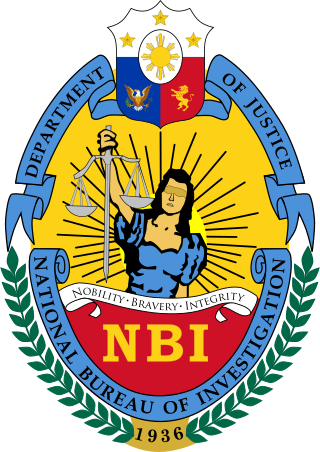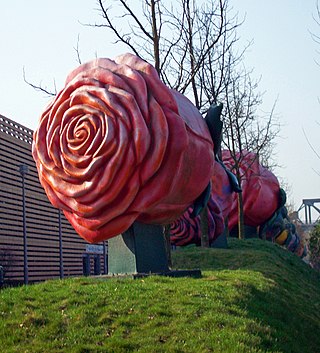
A copyright is a type of intellectual property that gives its owner the exclusive legal right to copy, distribute, adapt, display, and perform a creative work, usually for a limited time. The creative work may be in a literary, artistic, educational, or musical form. Copyright is intended to protect the original expression of an idea in the form of a creative work, but not the idea itself. A copyright is subject to limitations based on public interest considerations, such as the fair use doctrine in the United States and fair dealings doctrine in the United Kingdom.

Intellectual property (IP) is a category of property that includes intangible creations of the human intellect. There are many types of intellectual property, and some countries recognize more than others. The best-known types are patents, copyrights, trademarks, and trade secrets. The modern concept of intellectual property developed in England in the 17th and 18th centuries. The term "intellectual property" began to be used in the 19th century, though it was not until the late 20th century that intellectual property became commonplace in most of the world's legal systems.

The Office of the United States Trade Representative (USTR) is an agency of the United States federal government responsible for developing and promoting American trade policy. Part of the Executive Office of the President, it is headed by the U.S. Trade Representative, a Cabinet-level position that serves as the U.S. President's primary advisor, negotiator, and spokesperson on trade matters. USTR has more than two hundred employees, with offices in Geneva, Switzerland, and Brussels, Belgium.
Intellectual property rights (IPRs) have been acknowledged and protected in China since 1980. China has acceded to the major international conventions on protection of rights to intellectual property. Domestically, protection of intellectual property law has also been established by government legislation, administrative regulations, and decrees in the areas of trademark, copyright, and patent.
A copyright is the legal protection extended to the owner of the rights in an original work. Original work refers to every production in the literary, scientific, and artistic domains. The Intellectual Property Office (IPOPHL) is the leading agency responsible for handling the registration and conflict resolution of intellectual property rights and to enforce the copyright laws. IPOPHL was created by virtue of Republic Act No. 8293 or the Intellectual Property Code of the Philippines which took effect on January 1, 1998, under the presidency of Fidel V. Ramos.

The National Bureau of Investigation is an agency of the Philippine government under the Department of Justice, responsible for handling and solving major high-profile cases that are in the interest of the nation.

The purpose of copyright registration is to place on record a verifiable account of the date and content of the work in question, so that in the event of a legal claim, or case of infringement or plagiarism, the copyright owner can produce a copy of the work from an official government source.
Republic Act No. 8293, otherwise known as the Intellectual Property Code of the Philippines, defines a trademark as “any visible sign capable of distinguishing goods”. Early jurisprudence has taken it to mean “a sign, device or mark by which the articles produced or dealt in by a particular person or organization are distinguished or distinguishable from those produced or dealt in by others, and must be affixed to goods or articles”.

The Department of Trade and Industry is the executive department of the Philippine government responsible for the advancement, promotion, governance, regulation, management and growth of industry and trade.
Droit de suite (French for "right to follow") or Artist's Resale Right (ARR) is a right granted to artists or their heirs, in some jurisdictions, to receive a fee on the resale of their works of art. This should be contrasted with policies such as the American first-sale doctrine, where artists do not have the right to control or profit from subsequent sales.
The Serbian copyright act was published as the copyright act of Serbia and Montenegro on 24 December 2004, and it remains in force after the country's split under the "Declaration of Continuation by Republic of Serbia", September 19, 2006.

The National Book Development Board, abbreviated as NBDB, is an agency of the Philippine government under the Department of Education formed through Republic Act No. 8047 or the Book Publishing Industry Development Act, which was responsible for promoting the continuing development of the book-publishing industry in the Philippines, with the active participation of the private sector. NBDB's operational plans are: grassroots capacity-building initiatives, investment and trade promotion activities, public campaigns and institutionalized research and data gathering.
Copyright law in Azerbaijan governs copyright in Azerbaijan. The status of copyright law and its protection is regulated by the Law of the Republic of Azerbaijan signed in 1996. The Law on Copyright and Related Rights regulates the relations that arise while creating or using scientific and literary works, as well as works of art. According to this law, adjacent rights to performances, phonograms, and the transfer of broadcasting and cable broadcasting organizations are also streamlined. The Law was amended in 2001, 2002, 2004, 2005, 2008, 2010, 2013, 2017, 2018 and 2021.

Freedom of panorama (FoP) is a provision in the copyright laws of various jurisdictions that permits taking photographs and video footage and creating other images of buildings and sometimes sculptures and other art works which are permanently located in a public place, without infringing on any copyright that may otherwise subsist in such works, and the publishing of such images. Panorama freedom statutes or case law limit the right of the copyright owner to take action for breach of copyright against the creators and distributors of such images. It is an exception to the normal rule that the copyright owner has the exclusive right to authorize the creation and distribution of derivative works.

The following outline is provided as an overview of and topical guide to intellectual property:
The Copyright Clause describes an enumerated power listed in the United States Constitution.
Copyright law of North Korea is regulated by the Copyright Act of 2001. It introduced a 50 years p.m.a. protection, and has been amended several times. North Korea had no copyright law before that date. North Korea has been party to the Berne Convention since 2003. Relevant organizations include the Copyright Office of the Democratic People's Republic of Korea; Intellectual Property Administration of the Democratic People's Republic of Korea; Invention Office of the Democratic People's Republic of Korea; and the Trademark, Industrial Design and Geographical Indication Office (TIDGIO) of the DPR Korea.
Republic Act No. 8293, otherwise known as The Intellectual Property Code of the Philippines lays down the rules and regulations that grant, and enforce patents in the Philippines. Patents may be granted to technical solutions such as an inventions, machines, devices, processes, or an improvement of any of the foregoing. The technical solution must be novel, innovative, and industrially useful. In order for a technical solution to be granted a patent, the inventor must file an application to the Bureau of Patents, which will examine, and in some cases, grant its approval. The law is designed as to foster domestic creativity, to attract foreign investors, and to motivate inventors to release their products for public access.








